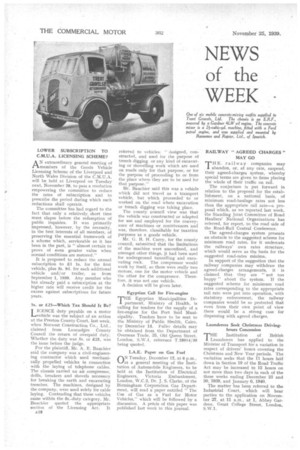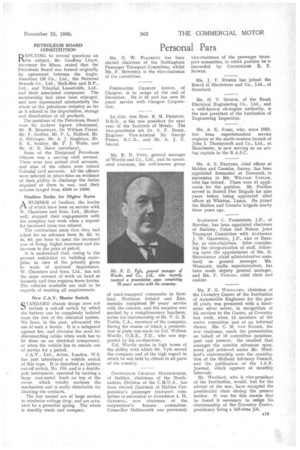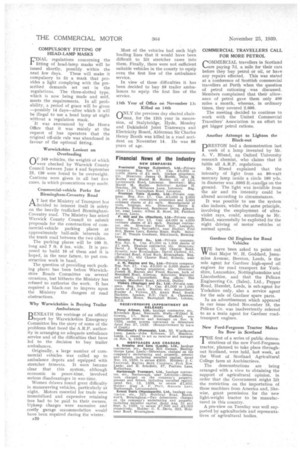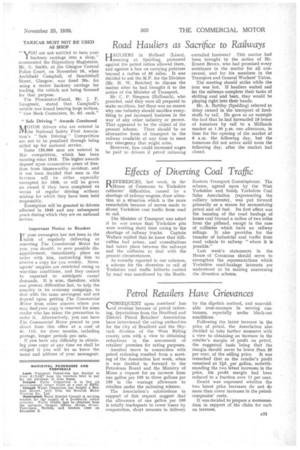NEWS of the WEEK .•
Page 20

Page 21

Page 22

Page 23

If you've noticed an error in this article please click here to report it so we can fix it.
LOWER SUBSCRIPTION TO C.M.U.A. LICENSING SCHEME?
AN extraordinary general meeting of members of the Goods Vehicle Licensing Scheme of the Liverpool and North Wales Division of the C.M.U.A. will be held at Liverpool on Tuesday next, November 28, to pass a resolution empowering the committee to reduce the rates of subscription and to prescribe the period during which such reductions shall operate.
The committee has had regard to the fact that only a relatively, short time must elapse before the regumption of public inquiries. It was primarily impressed, however, by the necessity, in the best interests of all members, of preserving the essential framework of a scheme which, serviceable as it has been in the past, is " almost certain to prove of even greater value when normal conditions are restored."
It is proposed to reduce the annual subscription to £1 is. for the first vehicle, plus 3s. 9d. for each additional vehicle and/or trailer, as from September 1, 1939. Any member who has already paid a subscription at the higher rate will receive credit for the excess against subscriptions for future years.
5s. or £25—Which Tax Should It Be?
LICENCE duty payable on a motor vehicle was the subject of an action at the Preston County Court, last week, when Norwest Construction Co., Ltd., claimed from Lancashire County Council the return of overpaid duty. Whether the duty was 5s. or £25, was the issue before the judge.
For the plaintiff, Mr. A. E. Bauchicr said the company was a civil-engineering contractor which used mechanically propelled vehicles in connection with the laying of telephone cables. The chassis carried an air .compressor, drills, breakers and shovels necessary for breaking the earth and excavating trenches. The machines, designed by the company, were used solely for cable laying. Contending that these vehicles came within the 5s.-duty category, Mr. Bauchier quoted the appropriate section of the Licensing Act. It referred to vehicles: " designed, constructed, and used for the purpose of trench digging. or any kind of excavating or shovelling work which are used on roads only for that purpose, or for the purpose of proceeding to or from the place where they are to be used for that purpose."
Mr. Bauchier said this was a vehicle which did not travel as a transport vehicle, but -which proceeded to or worked on the road where excavation or trench digging was taking place.
The county council view was that the vehicle was constructed or adapted for use and employed for the conveyance of machines or contrivances. and was, therefore, classifiable for taxation purposes as a goods vehicle.
Mr. G. B. H. Curry, for the county council, submitted that the limitations of the machine were unconfined, and amongst other things, it had been used for underground tunnelling and excavating rock. The compressor would work by itself, so there were really two motors, one for the motor vehicle and the other for the compressor. Therefore, it was not one vehicle.
A decision will be given later.
Egyptian Call for Fire-engine THE Egyptian Municipalities De
partment, Ministry of Health, is calling for tenders for the supply of a fire-engine for the Port Said Municipality. Tenders have to be sent to the Ministry of Public Health, Cairo, by December 14. Fuller details may be obtained from the Department of Overseas Trade, 35, Old Queen Street, London, S.W.1, reference T.28914/39 being quoted.
I.A.E. Paper on Gas Fuel
ON Tuesday, December 12, at 6 p.m., at a general meeting of the Institution of Automobile Engineers, to be held at the Institution of Electrical Engineers, Victoria Embankment, London, W.C.2, Dr. J. S. Clarke. of the Birmingham Corporation Gas Department, will read a paper entitled " The Use of Gas as a Fuel for Motor Vehicles," which will be followed by a discussion. A précis of this paper was published last week in this journal.
RAILWAY "AGREED CHARGES" MAY GO
THE rail way companies may abandon, or, at any rate, suspend, their agreed-charges system, whereby special terms are given to firms placing the whole of their traffic on rail.
The conjecture is put forward in relation to the proposal for the establishment, on a national basis, of minimum road-haulage rates not less than the appropriate rail rate—a proposal which, as we reported last week, the Standing Joint Committee of Road Hauliers' National Organizations has referred, for report, to the road side of the Road-Rail Central Conference.
The agreed-charges system presents an obstacle to the suggested scheme for minimum road rates, for it undercuts the railways' own rates structure, which would serve as the basis for the suggested road-rates minima.
In support of the suggestion that the railway companies may withdraw the agreed-charges arrangements, it is claimed that they are " not too happy" about the system. If the suggested scheme for minimum road rates corresponding to the appropriate rail rate were put into operation, with statutory enforcement, the railway companies would be so protected that even from their own point of view there would be a strong case for dispensing with agreed charges.
Launderers Seek Christmas Drivinghours Concession THE Institution of British Launderers has applied to the Minister of Transport for a variation in respect of drivers' hours covering the Christmas and New Year periods. The variation seeks that the 11 hours laid down in Section 19 of the Road Traffic Act may be increased to 12 hours on not more than two days in each of the three weeks ending December 23 and 30, 1939, and January 6, 1940.
The matter has been referred to the Industrial Court, which will hear parties to the application on November 27, at 11 a.m., at 1, Abbey Gardens, Great College Street, London, S.W.1. PETROLEUM BOARD CONSTITUTION
REPLYING to several questions on the subject, Mr. Geoffrey Lloyd, Secretary for Mines, stated that the Petroleum Board was formed originally by agreement between the AngloAmerican Oil Co., Ltd., the National Ben zole Co., Ltd., Shell-Mex and B.P., Ltd., and Trinidad Leaseholds, Ltd., and their associated companies. The membership had since been enlarged, and now represented substantially the whole of the petroleum industry so far as it related to the importation, storage and distribution of oil products.
The members of the Petroleum Board were Sir Andrew Agnew (chairman), Mr. R. Beaumont, Sir William Fraser, Mr. F. Godber, Mr. F. L. Halford, Mr. A. Hittinger, Mr. A. J. Singleton, Mr. E. E. Soubry, Mr. F. J. Wolfe, and Mr. H. E. Snow (secretary).
None of the Divisional Petroleum Officers was a serving civil servant. There were two retired civil servants, and nine of the others were retired Colonial civil servants. All the officers were selected in peace-time on evidence of their ability to discharge the duties required of them in war, and their salaries ranged from 500 to 4800.
Hauliers Strike for Higher Rates
ANUMBER of hauliers, the lorries of which have been on service with W. Chambers and Sons, Ltd.. Motherwell, stopped their engagements with the company last week when a request for increased rates was refused.
The contractors state that they had asked for an advance from 3s. 6d. to 4s. 6d. per hour to meet the increased cost of living, higher insurance and the increase in the price of petrol.
It is understood that, owing to the present restriction on building enterprise, in view of the priority given to work of national importance, W. Chambers and Sons, Ltd., has not the same amount of work on hand as formerly and thus requires fewer lorries. The vehicles available are said to be capable of meeting all requirements.
New C.A.V. Master Switch
STANDARD chassis design does not include a cut-off switch by which the battery can be completely isolated from the rest of the electrical system. We have, in the past, advocated the use of such a device. It is a safeguard against fire, and obviates the need for disconnecting cables when work has to be done on an electrical component, or when the vehicle has to remain out of service for a period.
C.A.V., Ltd., Acton, London, W.3, has just introduced a vehicle switch of this type. It is described as battery cut-off switch. No. 134, and is a doublepole instrument, operated by turning a large cast-metal knob on top of the cover, which totally encloses the mechanism and is easily detachable for cleaning the contacts.
The last named are of large section to minimize voltage drop, and are actuated by a powerful spring. The whole is sturdily made and compact. COMPULSORY FITTING OF HEAD-LAMP MASKS
FINAL regulations concerning the Ifitting of head-lamp masks will be issued shortly, possibly within the
next few days. These will make it compulsory to fit a mask that provides a light complying with the prescribed demands set out in the regulations. The three-slotted type, which is now being made and sold, meets the requirements. In all probability, a period of grace will be given —possibly 14 days—after which it will be illegal to use a head lamp at night without a regulation mask.
It was announced by the Home Office that it was mainly at the request of bus operators that the original off-side rule was abandoned in favour of the optional fitting.
Warwickshire Lenient on Overloading
r\F 349 vehicles, the weightS of which 1.-/were checked by Warwick County Council between June 4 and September 25, 130 were found to be overweight. Cautions were given in all but five cases, in which prosecutions weze made.
Commercial-vehicle Parks for Birmingham-Coventry Road AT last the Ministry of Transport has decided to interest itself in safety on the heavily trafficked BirminghamCoventry road. The Ministry has asked Warwick County Council to submit proposals for the construction of cornmercial-vehicle parking places at approximately half-mile intervals on the trunk road between the two cities.
The parking places will be 100 ft. long and 7 ft. 6 ins. wide. It is proposed to build 10 of them and it is hoped, in the near future, to put construction work in hand.
The question of providing such parking places has been before Warwickshire Roads Committee on several occasions, but hitherto the Ministry has refused to authorize the work. -It has required a black-out to impress upon the Ministry the dangers of road obstructions.
Why Warwickshire is Buying Trailer Ambulances
BENEATH the verbiage of an official report by Warwickshire Emergency Committee lies the story of some of the problems that faced the A.R.P. authority in arranging an adequate ambulance service and of the difficulties that have led to the decision to buy trailer ambulances.
Originally, a large number of commercial vehicles was called up to ambulance depots and equipped with stretcher fitments. It soon became clear that this system, although economic in peace-time, involved serious disadvantages in war-time.
Women drivers found great difficulty in manceuvring vehicles, particularly at night. Motors essential for trade were immobilized and expensive retaining fees had to be paid to their owners. Upkeep charges were excessive and costly garage accommodation would have been required during the winter. Most of the vehicles had such high loading lines that it would have been difficult to lift stretcher cases into them. Finally, there were not sufficient suitable vehicles in the county to equip even the first line of the ambulance service.
In view of these difficulties it has been decided to buy 59 trailer ambulances to equip the first line of the service.
13th Year of Office on November 13: Killed on 14th (NNLY the previous day elected chair man, for the 13th year in succession, of Staly bridge, Hyde, Mossley and Dukinfield Joint Tramways and Electricity Board, Alderman Sir Charles Henry Booth was killed in a road accident on November 14. He was 86 years of age. COMMERCIAL TRAVELLERS CALL FOR MORE PETROL COMMERCIAL travellers in Scotland ...."are paying 7d. a mile for their cars before they buy petrol or oil, or have any repairs effected. This was stated at a 'conference of Scottish commercial travellers at Perth when the question of petrol rationing was discussed. Members complained that their allowance of petrol gave them only 400 miles a month, whereas, in ordinary times, they covered 2,000. The meeting decided to continue to work with the United Commercial Travellers' Association in an effort to get bigger petrol rations.
Another Attempt to Lighten the Black-out
PRESTON had a demonstration last week of a lamp invented by Mr. A. V. Rhead, an Oxford University research chemist, who claims that it fulfils all A.R.P. regulations.
Mr. Rhead explained that the intensity of light from an 80-watt mercury lamp inside a circle 180 yds. in diameter was .0005 ft.-candles on the ground. The light was invisible from the air and its intensity could be altered according to circumstances.
It was possible to use the system also indoors, whilst the same principle, involving the employment of ultraviolet rays, could, according to Mr. Rhead, successfully be exploited for the night driving of motor vehicles at normal speeds.
Gardner Oil Engines for Road Vehicles WE have been asked to point out W that Major W. H. Goddard, Jessamine Avenue, Beeston, Leeds, is the sole agent for Gardner high-speed oil engines for road transport for Yorkshire, Lancashire, Nottinghamshire and Lincolnshire, and that the Pelican Engineering Co. (Sales), Ltd., Pepper Road, Hunslet, Leeds, is sub-agent for Yorkshire only, also a service agent for the sale of Gardner spare parts.
In an advertisement which appeared in our issue dated No‘ etnber 18, the Pelican Co. was inadvertently referred to as a main agent for Gardner roadtransport engines.
New Ford-Ferguson Tractor Makes Its Bow in Scotland
E first of a series of public demon
strations of the new Ford-Ferguson tractor, planned to take place throughout Scotland, were held, last week, at the West of Scotland Agricultural College farm at Auchincrieve.
The demonstrations are being arranged with a view to obtaining the support of agricultural opinion, in order that the Government might lift the restriction on the importation of these machines from America and, likewise, grant permission for the new light-weight tractor to be manufactured in this country.
A pre-view on Tuesday was well supported by agriculturists and representatives of agricultural bodies. TAXICAB MUST NOT BE USED AS SHOP
" YOU are not entitled to turn your hackney carriage into a shop," commented the Stipendiary Magistrate, Mr. G. Smith, at _the Glasgow Central Police Court, on November 16, when Archibald Campbell, of Sauchiehall Street, Glasgow, was fined 205. for using a motor hackney carriage for trading, the vehicle not being licensed for that purpose.
The Procurator-Fiscal, Mr. J. F. Langmuir, stated that Campbell's vehicle was found bearing large notices, " Gas Mask Containers, 2s. 6d. each."
"Safe Driving" Awards Continued
M0TOR drivers who are entered in the National Safety First Association's ." Safe Driving" Competition are not to be penalized through being called up for national service,
Some 120,000 men are entered in this competition, which has been running since 1918. The higher awards depend upon consecutive years of freedom from blameworthy accident, and it has been decided that men in the Services will be either especially exempted for 1339, or will be given an award if they have completed 44 weeks of regular driving without mishap for which they have been held responsible.
Exemption will he granted to drivers affected in 1940 and any subsequent years during which they are on national service.
Important Notice to Readers
I F your newsagent has not been in the habit of regularly delivering or reserving The Commercia/ Motor for you, you should, to save possible disappointment, immediately place an order with him, instructing him to reserve a copy for you weekly. Newsagents' supplies are restricted owing to war-time conditions, and they cannot be expected to anticipate casual demands. It is wise, therefore, while our present difficulties last, to help the country in its economy campaign, to deal with the same newsagent and not depend upon getting The Commercial Motor from other sources where you may find your copy is reserved for some reader who has taken the precaution to order it. Alternatively, you can have The Commercial Motor posted to you direct from this office at a cost of 4s. 11d. for three months, including postage, longer periods pro rata.
If you have any difficulty in obtaining your copy at any time we shall be obliged if you will let us know the name and address of your newsagent.






























































